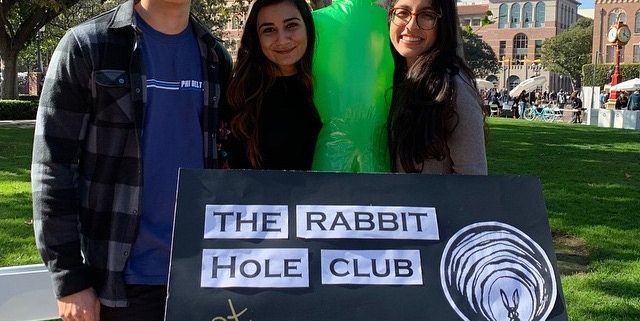Student group fosters conversation on conspiracy theories

When Philip Bliss first came to USC, he tried joining clubs on campus but found himself unable to connect with any. Inspired to come up with something new and exciting, he founded The Rabbit Hole, a club dedicated to conspiracy theories, last Spring.
“I just thought that there weren’t that many clubs on campus that were academic but also very laid-back,” said Bliss, a junior majoring in economics mathematics. “I think a lot of clubs at USC are super cool but they’re a bit pre-professional and sometimes students just don’t know how to handle that, myself included.”
The club gives students a platform to discuss, debate and vote on conspiracy theories, no matter how outlandish they might be. The meetings are bi-weekly and one member introduces a topic each meeting.
Other members share their viewpoints before the presentation and get the chance to ask questions and debate about the presentation after it is finished. Once that is done, members share whether they agree or disagree with the theory to see how the viewpoints may have shifted after the debate.
“The entire purpose of the club is to debunk well-known or even not well-known conspiracy theories. [It’s] really to just get exposed to different ideas,” Bliss said. “I try to facilitate a discussion that’s breaking down some of the areas of disagreement so we can kind of understand what we disagree on and why is that and what facts can be misleading.”
While some of the conspiracies discussed venture into the supernatural and spooky realm, others concern more serious topics. The latest presentation focused on presidential treason and war crimes committed by previous presidents.
“It definitely can make you question or be skeptical about the powers that govern us, but I think it’s very important to not become too pessimistic,” Bliss said. “We don’t want to be like typical conspiracy theorists who are jaded of the world. We just want to learn about these different topics and really see what they are objectively.”
Some of the past topics the club has covered include the War on Drugs, Nixon’s presidency and its effects on Black Americans and counterculture participants, the goals of former vice president Dick Cheney before and after 9/11, UFO sightings, Paul McCartney’s death and the Turkish military coup of 2016.
Piril Nergis, a junior majoring in electrical engineering, led the recent discussion on the 2016 Turkish military coup. Nergis said her Turkish background gave her a chance to dig into the topic and talk to her family, leading her to discover multiple potential theories about the event.
She also said it was a great opportunity to introduce other members to Turkey’s political climate. While she had been a member of the club and attended meetings last spring, this was Nergis’s first time presenting a topic.
“It’s pretty cool actually how open-minded everyone is,” Nergis said. “So usually how it works is that we do a background of a topic. We really dive into it … and then we go into more of what conspiracy theories we are looking at.”
“It’s pretty fun because people ask you questions in between and [Bliss] … actually does a really good job of asking the right questions and getting the audience to engage,” she added.
Bliss said that no topic is ever off-limits, as long as it is respectful and engaging.
“I just think it’s kind of fun to talk about this stuff with people and really be a reasonable person while doing so, and so I think in achieving that, I achieve exactly what I set out to do, but in the future I think it’d be great to do something a little bit more in regard to giving back, ” Bliss said.
The club sold T-shirts and donated the proceeds to to the Flint Water Fund following their discussion on the Flint water crisis last year. This year, they are discussing fundraising ideas for a children’s education project that connects the susceptibility of children from low-income backgrounds to the War on Drugs.
Vice President Michael Delucia said the club taught him to be unafraid of what he says and the position he takes, as long as he is respectful. He also says the club has engaged his critical thinking skills, enabling him to go further than a Google search to find answers on controversial issues.
“I hope it’s fun for a lot of other people and just gets your mind thinking more than anything,” Delucia said.
Delucia added that the club does not require members to attend every meeting but rather encourages them to focus on issues they are interested in.
“The biggest thing I see it bringing is that it’s an open forum for people to talk and share about things that, one, they’re very interested in, and two, are out of the normal scope of academia or normal media discourse,” Delucia said. “It really is like you’re going down the rabbit hole on a lot of things to find these hidden pieces of information.”

